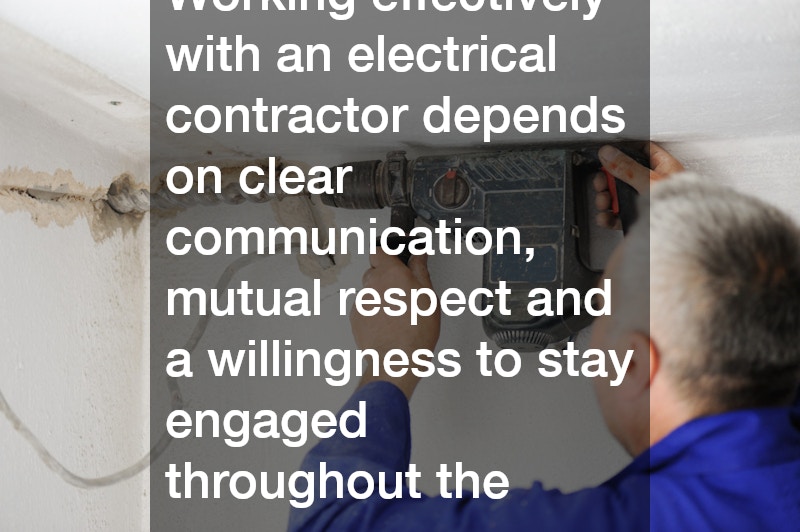Working with an electrical contractor can be a smooth and productive experience if approached with the right mindset and preparation. Whether you’re undertaking a residential renovation, a commercial fit-out, or a new build, successful collaboration with your contractor can make a substantial difference in terms of timelines, safety and budget.
Understanding the dynamics of this professional relationship ensures better outcomes and reduces the risk of misunderstandings or costly delays. Communication, clarity and respect all play a pivotal role in achieving a successful partnership.
Establish Clear Expectations from the Outset
Before any work begins, it’s essential to set out expectations clearly. This includes the scope of the work, project timelines, payment schedules and specific responsibilities. Taking the time to develop a comprehensive written agreement not only protects both parties legally but also serves as a reference point throughout the job. An experienced electrical contractor will usually provide a detailed quote outlining all services, labour, materials and contingencies. Make sure to review this thoroughly and ask questions about anything unclear.
Having an upfront conversation about your vision, design preferences and any future plans for electrical expansions or upgrades can also be beneficial. This allows the contractor to plan installations accordingly, such as leaving conduits accessible for future wiring or ensuring that electrical panels have room for additional circuits. Establishing a shared understanding early helps minimise disruptions once work begins.
Maintain Open Lines of Communication
Consistent communication is fundamental to a smooth working relationship. Keeping in regular contact with your electrical contractor enables you to stay informed about progress and any unforeseen issues that may arise. It also helps ensure that your contractor is aware of any changes in project scope, design adjustments, or site conditions.
Depending on the scale of the project, this communication may take the form of weekly site meetings, email updates, or phone calls. In smaller projects, even a quick check-in before and after each workday can suffice. The key is to remain proactive without micromanaging. Trust in the contractor’s expertise while making yourself available for questions and decisions.
When changes do need to be made, discuss them as early as possible. Delaying communication can result in unnecessary rework or cost overruns. Make sure all variations are documented in writing, whether they involve changes in fixtures, wiring locations, or additional circuits.
Understand the Basics of the Work Being Done
While you don’t need to be an electrical expert, having a basic understanding of what the electrical contractor is doing on your property can help you engage more effectively. Learn the general purpose of circuits, safety requirements and where key systems like the switchboard, outlets and lighting controls are located. This knowledge can be especially useful in future troubleshooting or maintenance.
Moreover, being informed allows you to ask smarter questions and make more confident decisions. For instance, knowing the differences between LED lighting systems, smart home integrations, or energy-efficient solutions can enable you to choose what best suits your needs and budget. A reputable electrical contractor will be more than willing to explain options and provide recommendations based on your goals and the latest regulations.
Respect Safety Protocols and Workspaces
Electrical work involves high-risk activities that require strict adherence to safety protocols. Your contractor is responsible for ensuring their team follows industry standards and Australian electrical regulations, but as a client, your cooperation is just as important. Avoid entering work zones unless invited and always respect signage or barriers. This ensures not only your safety but also that of the workers.
Allowing adequate space and time for the job is equally important. Electrical tasks often involve moving through multiple parts of a home or building, sometimes in confined or awkward spaces. Try to clear these areas in advance to avoid delays. Keeping children and pets away from the worksite is also a critical measure that should never be overlooked.
Finalise the Project Thoroughly
Once the work is complete, take the time to walk through the finished project with your electrical contractor. This final inspection ensures everything has been completed to specification and gives you the opportunity to clarify how the systems work. Ask your contractor to demonstrate safety switches, circuit breakers, or smart home features, especially if you’re unfamiliar with the technology.
It’s also wise to request all necessary documentation, including compliance certificates, warranty details and a summary of work completed. These records may be vital for insurance claims, future renovations, or property resale. Many professional contractors also offer maintenance tips or follow-up services, which can help prolong the life and efficiency of your electrical installations.
Building a Long-Term Relationship
For many homeowners and property managers, working with a reliable electrical contractor is not a one-off experience. Having someone you trust for future projects, upgrades, or emergency repairs is invaluable. Maintaining a professional relationship means you can reach out when you need advice or prompt service, often with better responsiveness than if you were contacting someone new.
In conclusion, working effectively with an electrical contractor depends on clear communication, mutual respect and a willingness to stay engaged throughout the process. From the initial planning phase to project completion and beyond, a cooperative approach ensures a safer, more efficient and ultimately more satisfying outcome for all involved.




